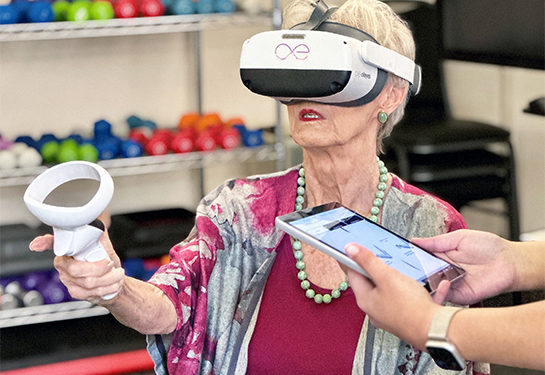Headaches
Headaches (which includes migraine) are a painful condition that can disrupt your daily life. Look to our neurologists who sub-specialize in headache medicine to help relieve your pain and symptoms.
Medically reviewed by Marc Lenaerts, M.D. on May 30, 2025.

What Are Headaches?
If you have headaches, you are not alone. Headaches are among the most common causes of pain and symptoms. They can affect how you live, work and play.
What you eat and drink, changes in the weather, and many other factors can trigger headaches. However, they often occur spontaneously.
UC Davis Health’s Department of Neurology offers treatment for all kinds of headaches you may have. We treat everything from chronic (several days per month) headaches, such as migraine, to sudden, severe headaches possibly linked to serious conditions. Our neurologists use the latest diagnostic testing and research to help you understand and manage head pain.
Types of Headaches
Headaches feel different to different people. There are a variety of causes, from your genetics to your environment. You can experience pain in different areas of your head. You may have a headache once or multiple times a day or over many days.
Primary Headaches
Primary headaches occur independently of other conditions. They are not symptoms of something else. Common primary headaches we treat include:
Migraine
More women than men get migraine headaches. Research links migraine to genetically inherited abnormalities in brain cells.
Cluster Headache
Attacks happen in clusters over days or weeks. They are more common in men than women.
Headache Associated with Sexual Activity
This type of headache occurs during or after sexual activity and is much less rare than previously thought.
New Daily Persistent Headache
This headache can mimic other types of headaches. It usually comes out of the blue and is daily from start.
Tension-Type Headache
The cause is unknown, but it can be triggered by mental stress.
Secondary Headaches
Secondary headaches are caused by other conditions, such as:
- brain bleed
- trauma
- infection
- tumors
- medications
- toxins (such as carbon monoxide)
- sleep apnea
- conditions of skull, neck, sinuses, etc.
- many other medical reasons
Common secondary headaches we treat include:
Altitude-Related Headache
This is throbbing head pain you feel when you travel to high altitudes or experience changes in weather (atmospheric pressure).
Cervicogenic Headache
Cervicogenic means pain that stems from a problem in your neck.
Giant Cell Arteritis
Inflamed arteries in the head and neck cause pain in your temples and vision problems. The pain can be very severe.
Idiopathic Intracranial Hypertension
Increased pressure in your brain fluid can cause pain and vision problems. Idiopathic means the cause is unknown.
Medication-Overuse Headache
Excessively frequent (over 10 days per month) use of relief medication tends to make the headache problem worse.
Post-Traumatic Headache
Head pain can be initially due to fractures, bruises, etc. In the long run, the pain system may be overactive after healing, causing chronic headache.
Trigeminal Neuralgia
When the trigeminal nerve, which carries any pain from the front two-thirds of the head, is irritated, it can cause electric sensations in the face.
Viral Meningitis
Viral meningitis is a viral infection that causes inflammation of your brain and spinal cord. It often occurs with stiff neck and fever.
Headache Symptoms
Headaches can be new or sudden and random or chronic. Pain can occur in different areas of your head, and characteristics can vary from person to person. You may have headache pain alone or with other symptoms.
Common Symptoms
Headache pain can be dull, throbbing, pounding or stabbing. Other symptoms that are common with headache include:
- Blurred vision and light sensitivity
- Nausea and vomiting
- Eyelid swelling and nasal congestion
- Pain worsening with physical activity
- Red, watery eyes and congested, runny nose
- Dizziness
- Sensitive scalp
- Aura (A collection of symptoms that happen together that include vision blur and shimmering lights, dizziness, numbness and weakness. They signal you are about to get a migraine.)
Worrisome Symptoms
Serious medical conditions can also cause headaches. Seek immediate care if you experience any of the following symptoms:
- First-time severe headache that affects daily activity
- Headache after exercise, head injury or sexual activity
- Headache with a history of cancer or a weakened immune system
- Headache with confusion, memory loss or changes in balance, coordination, speech or vision
- Headache with fever, nausea, stiff neck and vomiting
- Headaches with vision problems, painful chewing and unintentional weight loss
- More headache pain than you typically have
- New headaches (especially if you are age 50 or older)
- Severe headache in one eye with eye redness
- Sudden severe headache or worsening headache
Headache Causes and Triggers
Lots of things can trigger your headaches. These causes or triggers can include:
- Drinking alcohol
- Certain foods, including aged cheeses, caffeine, chocolate, deli meats, monosodium glutamate (MSG) flavor enhancer, nuts and sugar substitute
- Changes in atmospheric pressure
- Dehydration
- Hormonal changes or other chemical changes in your body
- Lack of sleep
- Medication overuse
- Neck problems
- Sexual activity
- Smoking
- Stress
- Sunlight
- Loud noises
Diagnosing Headaches
UC Davis is one of the nation's top hospitals for neurological care. We offer comprehensive diagnosis and testing – informed by the latest research – to pinpoint the cause when you have headaches.
To diagnose headaches, your physician will review your personal and medical history. It's helpful to keep a journal of symptoms and habits you have and share them at this appointment.
You may need more tests, including:
Headache Treatments
We offer a complete network of care for complex conditions. Our neurologists collaborate with specialists in neurosurgery, neuro-ophthalmology, ENT, pain management, and other disciplines. We regularly participate in clinical trials of new medications. Common treatments include:
Lifestyle Changes
Learn to avoid headache triggers, such as certain foods, smells, or stressors. Eat a healthy diet, exercise, stay hydrated, limit alcohol, and get enough and regular sleep.
Medication
Over-the-counter medicines like acetaminophen and non-steroidal anti-inflammatory drugs (NSAIDs), including aspirin and ibuprofen, can help with pain. Prescription medicines include Triptans and Gepants (specific migraine-relief prescriptions), non-specific prescriptions such as antidepressants, antiseizure, and blood pressure medicines, and specific preventive treatments, including calcitonin gene-related peptide (CGRP) inhibitors. They target CGRP, a small protein in the nervous system directly involved with migraine pain.
Nerve Blocks and Neurostimulation
Physicians use nerve blocks and neurostimulators (usually small devices that deliver an electric current to the head or other regions of the body) to reduce or eliminate headache pain. They interrupt and regulate signals to the brain that cause you to feel pain.
Stress Management and Other Therapeutic Approaches
Biofeedback, acupuncture, and meditation can reduce pain as well as help manage stress.
How common are migraines?
1 in 8Americans has migraine.
Migraine interferes with daily activities for
>90%Of people with migraine.
Source: American Migraine Foundation: Migraine 101
Request an Appointment
As Sacramento's No. 1 hospital, you'll benefit from unique advantages in primary care and specialty care. This includes prevention, diagnosis and treatment options from experts in 150 specialties.
Referring Physicians
To refer a patient, submit an electronic referral form or call.
800-4-UCDAVIS
Patients
Call to make an appointment.
Consumer Resource Center
800-2-UCDAVIS

Ranked among the nation’s best hospitals
A U.S. News & World Report best hospital in cardiology, heart & vascular surgery, diabetes & endocrinology, ENT, geriatrics, neurology & neurosurgery, and pulmonology & lung surgery.

Ranked among the nation’s best children’s hospitals
U.S. News & World Report ranked UC Davis Children’s Hospital among the best in pediatric nephrology, orthopedics*, and pulmonology & lung surgery. (*Together with Shriners Children’s Northern California)

Ranked Sacramento’s #1 hospital
Ranked Sacramento’s #1 hospital by U.S. News, and high-performing in aortic valve surgery, back surgery (spinal fusion), COPD, colon cancer surgery, diabetes, gynecological cancer surgery, heart arrhythmia, heart failure, kidney failure, leukemia, lymphoma & myeloma, lung cancer surgery, pacemaker implantation, pneumonia, prostate cancer surgery, stroke, TAVR, cancer, orthopedics, gastroenterology & GI surgery, and urology.

The nation’s highest nursing honor
UC Davis Medical Center has received Magnet® recognition, the nation’s highest honor for nursing excellence.

World-class cancer care
One of ~59 U.S. cancer centers designated “comprehensive” by the National Cancer Institute.

A leader in health care equality
For the 13th consecutive year, UC Davis Medical Center has been recognized as an LGBTQ+ Healthcare Equality Leader by the educational arm of America’s largest civil rights organization.

